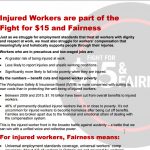Despite government promises to eliminate deeming, injured workers remain victims of the WSIB practice under a new name (“determining”). ![]()
Phantom job, phantom wages : “Deeming” refers to the practice used by the workers’ compensation Board to decide the compensation that it will pay for wage loss as a result of workplace injury or illness. It reduces a permanently injured worker’s loss of earning benefits under the pretence that the worker is employed. This systemically leads to poverty among injured workers.
In a letter to the Minister of Labour, Bright Lights Injured Workers’ Group members share their thoughts on what deeming means to each of them, how it impacts their lives, and why it is wrong. Compensation should be based on actual lost wages. Their question to the Minister: “Are you going to do the right thing and make the WSIB base our benefits on reality, instead of the jobs they pretend we have?”
Deeming and the minimum wage
 When the minimum wage is increased, the WSIB is able to deem people at a higher phantom wage as well. But as Rachel Gnanayutham (IWC) discussed in the Feb. 2017 issue of ONIWG’s Justice for Injured Workers newspaper, “the minimum wage is not the enemy here. The enemy is deeming. We must therefore demand an end to deeming at the same time as we demand a higher minimum wage. Compensation should be based on actual lost wages..”
When the minimum wage is increased, the WSIB is able to deem people at a higher phantom wage as well. But as Rachel Gnanayutham (IWC) discussed in the Feb. 2017 issue of ONIWG’s Justice for Injured Workers newspaper, “the minimum wage is not the enemy here. The enemy is deeming. We must therefore demand an end to deeming at the same time as we demand a higher minimum wage. Compensation should be based on actual lost wages..”
The struggle for decent work and the struggle for decent workers’ compensation are inextricably linked. Which is why it is important for injured workers to support the province-wide Fight for $15 and Fairness campaign that calls respect for workers with fair employment conditions and protections.
Learn more:
- Operation Maple. Injured Workers Abandoned by Workers Comp – Tweduda’s Story (video)
- Injured Workers’ History Project. 2007. Deeming: It’s Just Wrong! Toronto: Bancroft Institute